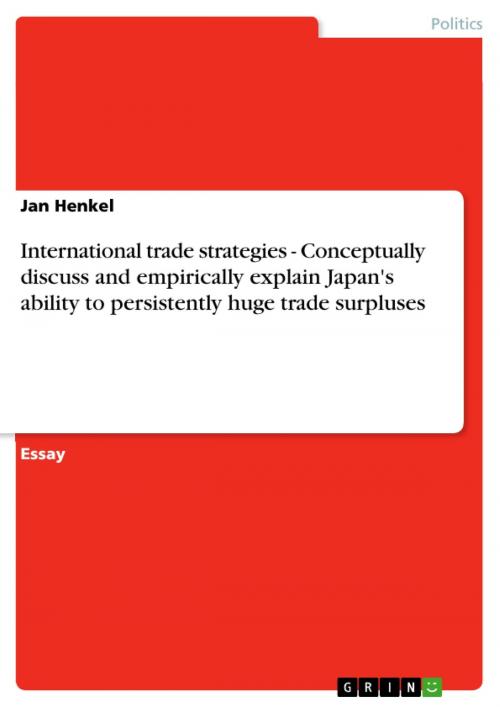International trade strategies - Conceptually discuss and empirically explain Japan's ability to persistently huge trade surpluses
Conceptually discuss and empirically explain Japan's ability to persistently huge trade surpluses
Nonfiction, Social & Cultural Studies, Political Science, Government, Public Affairs & Administration| Author: | Jan Henkel | ISBN: | 9783638500166 |
| Publisher: | GRIN Publishing | Publication: | May 11, 2006 |
| Imprint: | GRIN Publishing | Language: | English |
| Author: | Jan Henkel |
| ISBN: | 9783638500166 |
| Publisher: | GRIN Publishing |
| Publication: | May 11, 2006 |
| Imprint: | GRIN Publishing |
| Language: | English |
Essay from the year 2004 in the subject Politics - International Politics - Region: Other States, grade: high distinction (87/100), The University of Sydney (Faculty of Economics and Business), course: Economic develoment of modern Japan, 11 entries in the bibliography, language: English, abstract: In the early 1950s 'export or die' was a national slogan, which describes one strategy of the govenment to ensure economic growth in Japan. This essay is dealing about international trade strategies in Japan after the second World War. The major goal of this work is to conceptually discuss and emprically explain how it was possible for Japan to sustain huge trade surpluses. First of all it is necessary to define what is meant by trade surplus. A trade surplus exists when the balance-of-trade of a country is positive. That means that the extent of the value of merchandise exports has to exceed the value of merchandise imports (Levi: p. 589). In general a country can achieve a trade surplus if it tries to maximize its exports and to minimize its imports. The structure of my essay is followed by these two principles. Therefore a first part will deal with the exports of Japan, i.e. with the question how exports can be maximized. I will try to dicuss how exports have been promoted by MITI and what further circumstances led to the significant growth of the export sector. In a second part I am going to analyse the restrictions on imports. This chapter will include the explanation of tariff and non- tariff barriers as well as a discussion about the closed nature of the Japanese market. But previous it is necessary to deal with the theoretical concepts. After that I am going to compare these with what happened in the Japanese reality so that I can finally summarize which factors have been the most influential to maintain the surplus of Japanese balance- of- trade.
Das Studium der Volks- und Betriebswirtschaftslehre und der Politik- und Rechtswissenschaft an der Ruprecht-Karls-Universität Heidelberg und der University of Sydney schloss ich erfolgreich als Diplom-Volkswirt und mit Magister ab. Ich verfüge über theoretisches und praktisches Fachwissen als (Text-) Autor, Berater, Coach und Lehrbeauftragter in den Bereichen Marketing, Kommunikation und Organisation, das ich unter anderem als mehrjähriger Leiter der Unternehmenskommunikation einer in ihrem Fachgebiet führenden Managementberatung und durch das Veröffentlichen einer Vielzahl von Beiträgen erworben habe. Nun möchte ich diese Expertise an Sie weitergeben, in dem ich Sie als Texter, Coach und Berater dabei unterstütze Ihre Zielgruppen adäquat anzusprechen und durch eine professionelle Textgestaltung eine effektive und effiziente Marketingkommunikation zu betreiben. Weiterführende Informationen unter www.henkel-consultatio.de
Essay from the year 2004 in the subject Politics - International Politics - Region: Other States, grade: high distinction (87/100), The University of Sydney (Faculty of Economics and Business), course: Economic develoment of modern Japan, 11 entries in the bibliography, language: English, abstract: In the early 1950s 'export or die' was a national slogan, which describes one strategy of the govenment to ensure economic growth in Japan. This essay is dealing about international trade strategies in Japan after the second World War. The major goal of this work is to conceptually discuss and emprically explain how it was possible for Japan to sustain huge trade surpluses. First of all it is necessary to define what is meant by trade surplus. A trade surplus exists when the balance-of-trade of a country is positive. That means that the extent of the value of merchandise exports has to exceed the value of merchandise imports (Levi: p. 589). In general a country can achieve a trade surplus if it tries to maximize its exports and to minimize its imports. The structure of my essay is followed by these two principles. Therefore a first part will deal with the exports of Japan, i.e. with the question how exports can be maximized. I will try to dicuss how exports have been promoted by MITI and what further circumstances led to the significant growth of the export sector. In a second part I am going to analyse the restrictions on imports. This chapter will include the explanation of tariff and non- tariff barriers as well as a discussion about the closed nature of the Japanese market. But previous it is necessary to deal with the theoretical concepts. After that I am going to compare these with what happened in the Japanese reality so that I can finally summarize which factors have been the most influential to maintain the surplus of Japanese balance- of- trade.
Das Studium der Volks- und Betriebswirtschaftslehre und der Politik- und Rechtswissenschaft an der Ruprecht-Karls-Universität Heidelberg und der University of Sydney schloss ich erfolgreich als Diplom-Volkswirt und mit Magister ab. Ich verfüge über theoretisches und praktisches Fachwissen als (Text-) Autor, Berater, Coach und Lehrbeauftragter in den Bereichen Marketing, Kommunikation und Organisation, das ich unter anderem als mehrjähriger Leiter der Unternehmenskommunikation einer in ihrem Fachgebiet führenden Managementberatung und durch das Veröffentlichen einer Vielzahl von Beiträgen erworben habe. Nun möchte ich diese Expertise an Sie weitergeben, in dem ich Sie als Texter, Coach und Berater dabei unterstütze Ihre Zielgruppen adäquat anzusprechen und durch eine professionelle Textgestaltung eine effektive und effiziente Marketingkommunikation zu betreiben. Weiterführende Informationen unter www.henkel-consultatio.de















